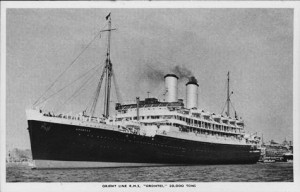 The SS Orontes was the first of a dozen ships my mother sailed on. This was the start of a beautiful friendship with ships’ captains, for on every sea voyage, my mother was always invited to dine at their table even if it meant dragging my father along.
The SS Orontes was the first of a dozen ships my mother sailed on. This was the start of a beautiful friendship with ships’ captains, for on every sea voyage, my mother was always invited to dine at their table even if it meant dragging my father along.
Weeks later, after a journey through the Mediterranean Sea, mum and dad arrived in Southampton and took the train to London.
The city was full of people who spoke with a cockney accent, just like the ones she had seen in English movies back in India. She thought they were comedy voices, not realising this is how they really talked.
While my father was arranging transport for their luggage, my mother took out a cigarette and not having any matches, she asked a passing gentleman for a light, he picked up speed and said, “not today thank you”. Unbeknown to my mum, this was the classic line delivered by prostitutes to solicit customers.
At the beginning of the war, Nana (my paternal grandmother) lived in Woolwich, next to the Royal Arsenal (armaments factory). In 1940, my father moved her out and sent her to live with his sister in Yorkshire. A week after Nana vacated her house, it was bombed. It wasn’t personal as the whole street was obliterated.
Just a little note about my grandmother. Nana and my grandfather planned to emigrate to the United States, they had arranged to sail from Southampton. Before they were to travel, she had a disturbing dream and made the decision not to go. It was April 1912 and the ship, RMS Titanic.
Mum went up to the industrial city of Bradford in Yorkshire to stay with her mother-in-law and Eva, her sister-in-law.
Eva’s husband Allen was in the Navy assigned to an LCT (landing craft tank), he had taken part in the D-Day landings prior to that ‘Operation Torch’ in North Africa, ‘Operation Husky’ in Sicily and later, one in Burma. Anyone would think the Royal Navy only had one landing craft.
Taking his young bride to see Britain and meet his family was a complete culture shock to her.
Meanwhile to make things worse, my dad was transferred to Germany. In India, he was assigned to an animal transport regiment; in their wisdom they posted him to a mechanised transport regiment, one drawback, he couldn’t drive. Being an officer, he rectified this quite sharply and gave himself a licence. It was 30-plus years before he was forced to take a driving test.
One night after an evening of drinking, my father found himself on the wrong side of a river to his billet. There was a bridge, but it had been bombed and only a single ice-covered girder straddled the river. He traversed the narrow obstacle and lived to do something more stupid another day.
Being apt at languages, he learnt German and for his efforts, the army made him a town major within the British Zone of the occupying forces. Coincidentally, he had been posted to a town near his uncle’s wife’s family.
At this point an explanation is needed: my dad’s uncle Joe worked for a bank and was assigned to a branch in pre-war Germany. He was an active socialist and made his views known by regularly denouncing the Nazi regime from a soap box, this is where he met his like-minded German wife. Just a few months before the outbreak of the war, the Gestapo raided his house, luckily, they had been tipped off and fled to England the day before.
